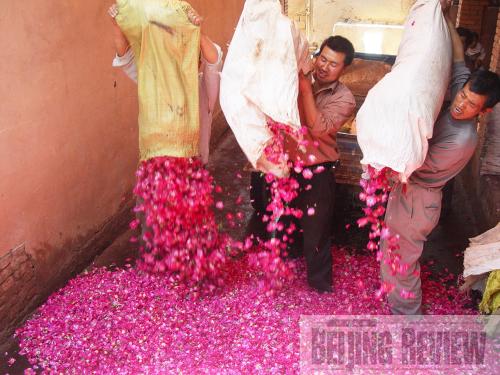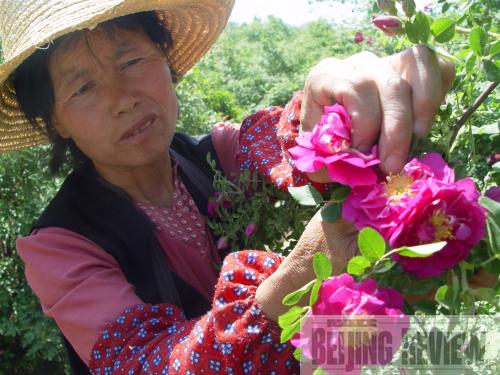|
 |
|
COLOR CASCADE: Farmers in Yongdeng County sell rose buds (CFP) |
The rose is commonly called the "flower of love," representing romance and passion. Today, farmers in Yongdeng County, in northwest China's Gansu Province, have a new reason to fall in love—a local variety of the blooming beauty has become the area's pot of gold.
Yongdeng County, situated in the central part of the province, is known as China's rose nursery. Local government data show that 2,000 hectares, or half of the county's lands, are dedicated to growing roses this year, which accounted for 70 percent of China's total.
What's in a name
Yongdeng has its own well-known brand of roses. Because the county's Kushui Township grows China's best roses, the name Kushui rose has become tied to all the flowers coming out of Yongdeng, said Yu Wancheng, head of the Kushui Rose Association.
 |
|
SOFT TOUCH: A farmer picks roses in Kushui Township in Yongdeng County, Gansu Province (CFP) | The Kushui rose is the result of crossbreeding between two different species, according to Yu. It is resistant to cold and drought, cares little for the quality of its soil and grows well in both acidic and alkaline soils. Its resistance to alkaline environments is especially important in dry northwest China.
The town plants more than 460 hectares of roses and harvests about 2.8 million kg annually, said Zhang Tianquan, a township official.
Shi Maolin, a farmer in Kushui's Shangxingou Village, has grown roses for eight years. He said he invested 100,000 yuan ($14,600) in 2000 and planted 1.33 hectares of roses. "That was the beginning of my bond with roses," said Shi. Today, he farms the largest area of roses in Kushui.
May is the middle of the harvest season for roses, he said. This year the price for fresh flowers has reached 14 yuan ($2.05) per kg, increasing 200 percent from the previous year. The price of dried flower buds is 70 yuan ($10.25) per kg, which is the highest it has ever been.
"All families in our village are now growing roses and the total area being cultivated is about 27 hectares, which can produce more than 400,000 kg of wet flower buds," said Shi. "With the increase in prices, villagers can get more money this year."
This year's output in Kushui alone will be worth more than 10 million yuan ($1.46 million). That number comprises 15 percent of the total income for the township's farmers, said Zhang.
"Yongdeng is the biggest provider of roses in China and a major provider around the world," said Zhang. Every year, he said, many buyers come to purchase fresh flowers and wet and dried buds.
From one, many
The county has formed a mature rose industry, with many different processing operations going on, said Zhang.
He said fragrant roses can be preserved in sugar or honey, used to make wine, sauce, tea or various cakes and candies. "The Kushui rose is perfect for its sweet and enchanting aroma that is well known all over the world," he said.
Years ago, Shi registered Lanzhou Rose Maolin Processing Industry Corp., a company that makes all kinds of rose products.
"Our factory provides rose foods, beverages and teas," said Shi. Rose-containing products are rich in vitamin C and good for people's health. Products made from rose flowers and roots can also be used as herbal medicines because they relieve suppression of liver and invigorate blood circulation, he said.
In 2003, he bought three specialized machines and started processing rose extract.
According to Jiang Yumei, a College of Food Science and Engineering professor at Gansu Agricultural University, the Kushui rose is the best variety to produce the essence and attar of rose in China because of its high blooming rate and oil percentage. "In general, 10,000 kg of fresh rose petals are needed to produce 4 kg of oil. The oil percentage of the Kushui rose is more than that," Jiang said.
"In order to capture their unique Oriental aroma, the roses are always collected when they are just about to open and steam-distilled immediately," said Shi.
| 